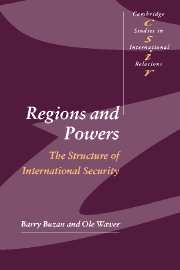Book contents
- Frontmatter
- Contents
- List of illustrations
- Preface
- List of abbreviations
- 1 Patterns of regional security during the Cold War
- 2 Patterns of regional security post-Cold War
- Part I Introduction: developing a regional approach to global security
- Part II Asia
- Part III The Middle East and Africa
- Introduction
- 7 The Middle East: a perennial conflict formation
- 8 Sub-Saharan Africa: security dynamics in a setting of weak and failed states
- Conclusions
- Part IV The Americas
- Part V The Europes
- Part VI Conclusions
- Glossary
- References
- News media
- Index of names
- General Index
- CAMBRIDGE STUDIES IN INTERNATIONAL RELATIONS
Conclusions
Published online by Cambridge University Press: 05 December 2009
- Frontmatter
- Contents
- List of illustrations
- Preface
- List of abbreviations
- 1 Patterns of regional security during the Cold War
- 2 Patterns of regional security post-Cold War
- Part I Introduction: developing a regional approach to global security
- Part II Asia
- Part III The Middle East and Africa
- Introduction
- 7 The Middle East: a perennial conflict formation
- 8 Sub-Saharan Africa: security dynamics in a setting of weak and failed states
- Conclusions
- Part IV The Americas
- Part V The Europes
- Part VI Conclusions
- Glossary
- References
- News media
- Index of names
- General Index
- CAMBRIDGE STUDIES IN INTERNATIONAL RELATIONS
Summary
One comparative insight comes from Krause's (1996) argument about how most of the third world has failed to benefit from the developmental interplay between war and state-making that eventually generated the strong states of Europe. Given the accounts just presented, Krause's argument would seem to hold true for both Africa and the Middle East, though its effects have been quite different between the two. In Africa, the ability of military-political elites to obtain economic resources to fight wars without engaging in the economic or political development of their societies has largely wrecked the process of state formation. On the other hand, in the Middle East it has resulted in the consolidation of a regional state system populated largely by authoritarian regimes, and full of interstate wars and rivalries. Consequently, in neither place is there much prospect of democratisation, and therefore not much hope of democratic peace. In both areas, pan-ideologies remain influential, but subordinate to more fragmented political structures. Both areas are also subject to strong patterns of securitisation by the West that are in some respects markedly different from the patterns of securitisation generated within the regions. The West (especially Europe) fears migration from both, and securitises oil, WMD, and radical Islam in the Middle East, and public health and the environment in Africa.
The political disintegration of Africa and the interstate conflict formation in the Middle East respectively underpin the prognoses that RSCT allows us to project for them.
- Type
- Chapter
- Information
- Regions and PowersThe Structure of International Security, pp. 254 - 260Publisher: Cambridge University PressPrint publication year: 2003

